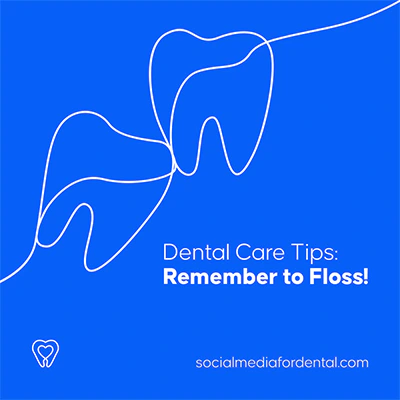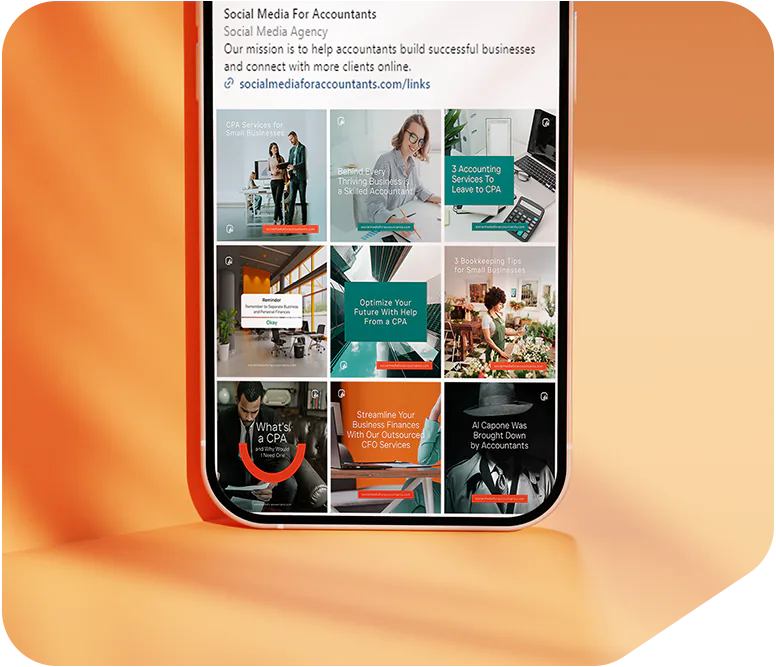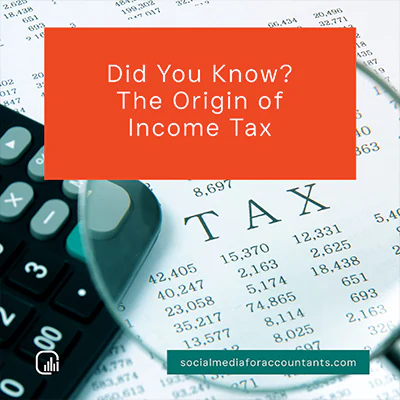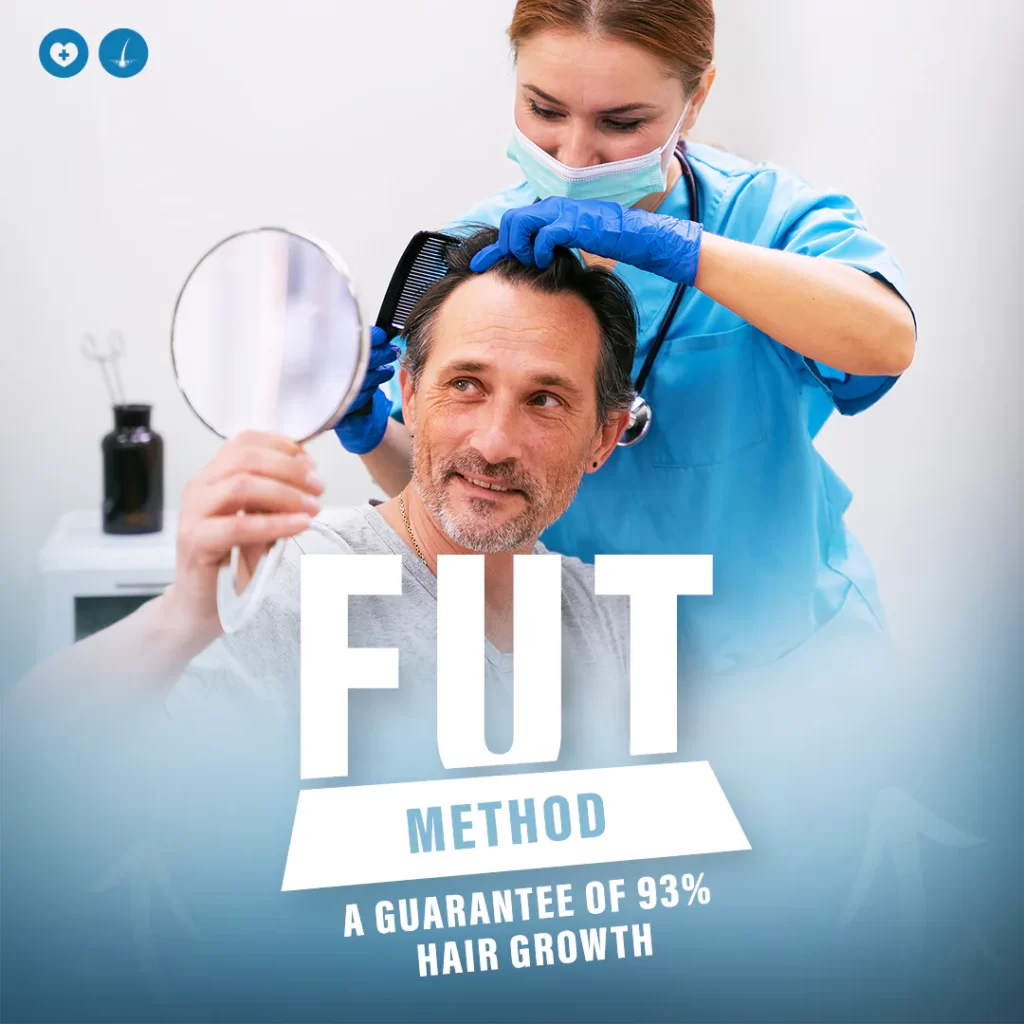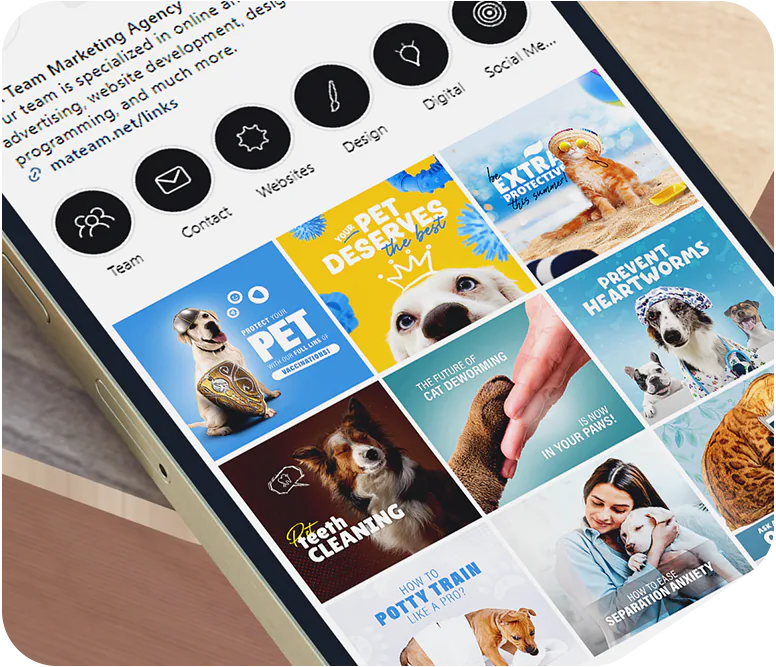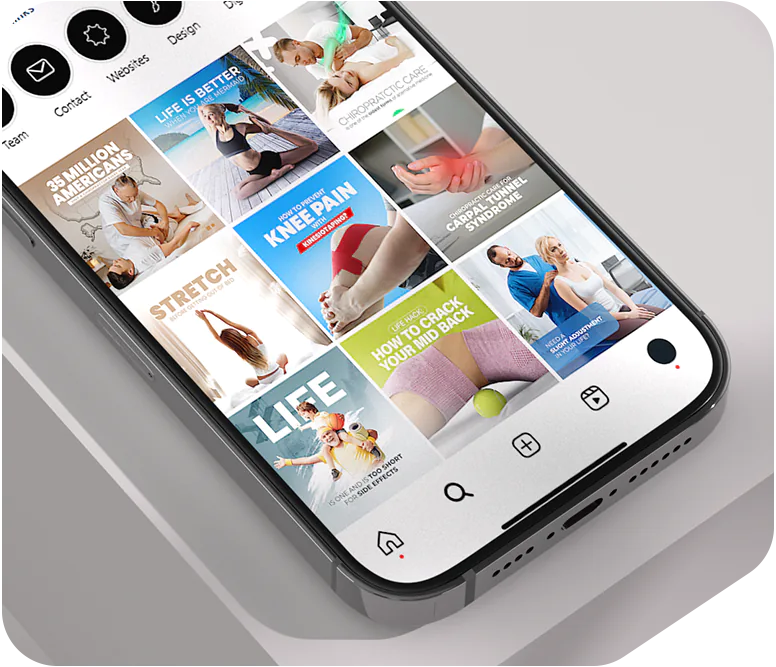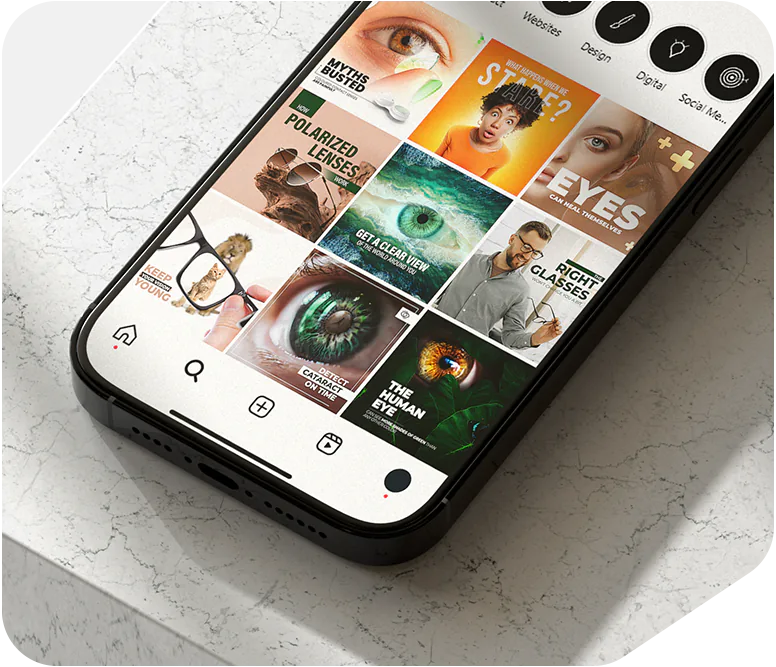Social Media Marketing Services
Today, social media isn’t just a nice-to-have – it’s a must for your business. Your audience is online, and to stay ahead, you need a strategy that connects, engages, and converts.
That’s where we come in! From content creation and paid ads to trend-spotting and reputation management, we take the guesswork out of social media. Whether you want to grow your brand, reach new customers, or build loyalty, we make it happen.
Let’s turn your social presence into real business results!
Request a Free Quote
How Does Social Media Marketing Enhance the Growth of Your Business?
Social media marketing enhances the growth of your business by boosting your brand’s visibility, driving traffic to your website, connecting with your audience, getting loyal customers, generating leads, and increasing your sales.
Think about it – everyone’s on social media today, and your business should be, too! By posting consistently and running the right campaigns, you can get your brand in front of the right people.
Instagram, Facebook, TikTok, LinkedIn, and other platforms let you show off your products or services, spark conversations, and build great relationships.
You can also run targeted ads that zero in on your ideal customers. No wasting time on people who aren’t interested. Plus, when you engage with followers and respond to their comments, they see the human side of your business, which builds trust.

Social media even lets you track what’s working and what’s not. With each platform’s insights, you’ll see which posts get clicks and which ads bring in sales. It’s all about using that data to keep improving.

Beyond content and ads, agencies monitor analytics, engagement, and campaign results. Hiring a social media agency lets you focus on running your business while they drive your online growth and success.
What Are the Advantages of Hiring a Social Media Agency?
The advantages of hiring a social media agency are lots of saved time, bringing expert strategies, creating better content, running effective ad campaigns, tracking performance, and helping you grow faster.
Instead of guessing, a professional agency uses data-driven insights to create targeted campaigns that attract and engage the right audience. With a team of skilled content creators, they produce high-quality posts, videos, and graphics.
Running ads online is another area where an agency makes a huge difference. They optimize paid campaigns to ensure your budget is spent wisely, targeting the right people at the right time.
Why Should You Hire MA Team as Your Social Media Partner?
You should hire MA Team as your social media partner because we stay ahead of trends, have a creative team full of fresh ideas, love what we do, and genuinely want to help you grow. We know what it’s like to be at the start of building a business.
Our team is made up of passionate, creative minds who live and breathe social media. We’re always on top of the latest trends, as we don’t want to miss a single thing!
We get it – starting or growing a business can be tough, so we focus on strategies that actually work, not just what looks good on paper. We love brainstorming cool ideas, creating posts that stop the scroll, and running campaigns that drive real results.
Let’s grow your brand together and make your social media something you’re truly proud of!
How Much Do Social Media Services Cost?
The cost of our social media services is flexible and tailored to your needs. We offer custom plans designed for small and medium-sized businesses, ensuring you get the right level of service without overspending.
The cost depends on the type of content, posting frequency, and overall strategy you want for your social media presence. Whether you need basic management or a full-scale marketing approach, we have packages to fit your budget.
Schedule a meeting with us today, and let’s talk about how we can help you shine online!
Feed Presentation
What Social Media Marketing Services Do We Offer?
We connect to your accounts and handle the whole social media marketing for you! From content creation to ads, engagement, and analytics, you can expect us to cover everything. Below is a complete list of the services we provide.
Social Media
Paid Advertising
Social media paid advertising is the practice of using targeted ads on social media platforms to reach the right audience, generate leads, and grow your business faster.
Over 4 in 5 marketers surveyed globally said that increased exposure was the primary benefit of social media marketing in 2024, according to Statista. See, it’s a game-changer for making your business visible to those who matter most. However, it can get really tricky if you don’t know what you’re doing.
It’s your hard-earned money, and you want to make sure it’s a good investment. That’s why it’s better to leave your paid ads to the experts at MA Team. We know how to get it right!
Not sure how to target the right audience or drive valuable leads? Want to advertise in different languages? We’ve got you covered. We’ll create campaigns tailored to your audience, wherever they are.
You focus on your business, and we’ll focus on making your ads work!
Social Media
Content Creation
Facebook
Marketing
Instagram
Marketing
TikTok
Marketing
YouTube
Marketing
X (formerly Twitter) Marketing
Google Business Profile
LinkedIn Marketing
What Are Your Niche Industries for Social Media Expertise?
Our niche industries for social media expertise are trucking, dental, accounting, and healthcare. However, with a talented design team and great strategists, we can take on any industry and create campaigns that actually drive results.
In trucking, we know how to highlight driver recruitment and safety while making your company stand out. In dental, we help practices shine with patient-centered content that educates and builds credibility.
For accounting, we make numbers approachable and position you as a trusted expert. And in healthcare, we create empathetic, relatable campaigns that connect with people who need it most.
Whatever your industry, we take the time to understand your brand, audience, and goals. Social media isn’t just about looking good – it’s about making a real impact, the one that will make you stand out from the rest.
At MA Team, we’re here to do just that!
Portfolio
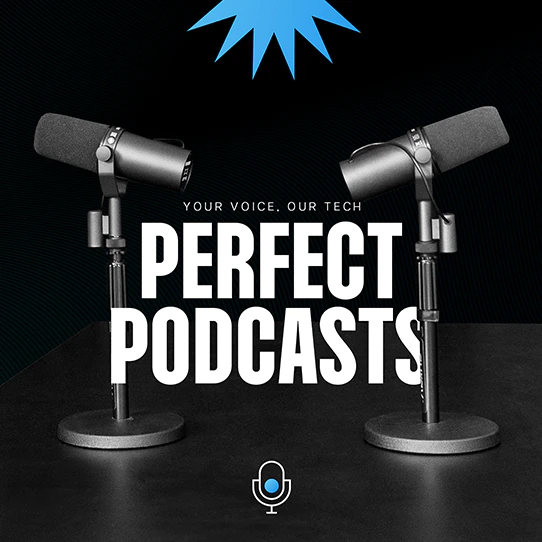


See the Work That Speaks for Itself!
At MA Team, we offer a variety of digital marketing services to extend and strengthen your brand. We’d like to show off some of our most recent and best work to give you a better idea of the services we could provide for you. Preview the social media examples we made for our clients below.
MA Teams’ portfolio is constantly a work in progress and as we are busy creating, we are always excited to upload new content. Check back soon to see newly completed projects!


Testimonials
Why People Chose Us - and Why You Should Too.







Dr. Lana Kashlan
Board Certified Dermatologist
ModernSkin Dermatology
Dr. Bianca Hassoun
Board-Certified Pediatric Dentist
Libertyville Pediatric Clinic
What Types of Social Media Content Should You Create?
The types of social media content you should create are short-form videos, carousel posts, infographics, user-generated content (UGC), and live streams.
Short-form videos, like TikToks or Instagram reels, grab attention quickly and are widely shared. Recently, Instagram announced that you can record and edit videos up to 3 minutes long. You can add effects and music to your reel or use your own original audio, so why not try it out?
Carousel posts allow you to tell a story or share detailed information in a swipeable format. Infographics make complex topics simple and visually appealing.
UGC builds trust because it shows real people using your products or services. Live streams let you connect with your audience in real time, building authenticity and engagement.
How to Create Engaging Content for Your Audience?
To create engaging content for your audience, focus on being clear, concise, and creative. Have a unique voice, know your niche, understand who you’re talking to, and create content that speaks directly to people’s needs.
Start by defining your brand’s personality, whether it’s professional, fun, or bold. Keep that tone consistent. Understand your audience’s preferences by researching their habits and what excites them.
Use creative formats like short-form videos or eye-catching infographics that are easy to consume. Keep your message simple but impactful. Don’t overcomplicate it.
Make your audience feel seen. Talk about their problems and how your content helps them solve those challenges. Experiment with trends, but add your own twist to stand out. Engage with your people through comments, DMs, or by asking questions to start conversations.
Is Video Content Necessary in 2025?
Yes, video content is necessary in 2025. It grabs attention, boosts engagement, builds trust, explains complex ideas, improves SEO rankings, and drives conversions.
In 2025, people want quick, visual answers. By using video, you meet their needs and show your business cares about their experience.
Videos are powerful because they communicate information quickly and keep people interested longer. Audiences are more likely to watch a video than read a long text post. Therefore, creating videos has become quite expected of a business.
How to Handle Negative Feedback or Comments on Social Media Posts?
To handle negative feedback or comments on social media posts, you must stay calm, respond politely, acknowledge concerns, offer solutions, and avoid deleting constructive criticism.
Negative comments can feel overwhelming, but responding well can turn them into opportunities. First, take a deep breath and don’t respond emotionally. A calm, respectful tone can defuse tension. Thank the person for their feedback, even if it’s hard to hear.
If the comment highlights a genuine issue, apologize if necessary and explain how you’ll fix it. Avoid arguing, as this can escalate the situation and harm your brand image.
For especially heated comments, consider moving the discussion to private messages. This keeps the conversation productive without a public back-and-forth.
If a comment is clearly spam or abusive, it’s okay to delete it to maintain a positive environment.
What Are the Most Important Steps in Creating a Content Strategy?
The most important steps in creating a content strategy are defining your goals, knowing your audience, choosing the right platforms, planning content types, creating a content calendar, and analyzing performance regularly.
Start by defining your goals. Ask yourself what you want to achieve – brand awareness, more sales, or better engagement. Clear goals guide all your decisions. Next, know your audience. Research their preferences, habits, and what content they find valuable.
Choose the right platforms based on where your audience is most active. Focus on quality over quantity. Plan content types that match your goals, like tutorials for education or stories for authenticity.
A content calendar helps you stay consistent. Organize posts ahead of time to maintain a steady flow. Be sure to include a mix of topics to keep your audience interested.
Finally, analyze your performance. Check what works and what doesn’t by looking at likes, shares, and clicks. This way, you’ll create a strategy that’s well-planned and adaptable to what works best.
What Are the Key Metrics to Track the Performance of Social Media Content?
The key metrics to track the performance of social media content are reach, engagement rate, click-through rate (CTR), conversion rate, follower growth, and impressions.
Reach measures how many unique users see your content. It tells you how far your post is spreading. Engagement rate shows how much your audience interacts with your content through likes, comments, shares, or saves. A high engagement rate means your content connects with your audience.
Click-through rate tracks how many people clicked on a link in your post compared to how many saw it. It’s crucial for measuring traffic to your website or landing page.
The conversion rate shows the percentage of people who take a desired action, like signing up for a newsletter or making a purchase.
Follower growth reveals whether your audience is expanding over time. A steady increase means your content is attracting new followers. Lastly, impressions measure how many times your post is shown, including repeat views. High impressions indicate strong visibility.
How to Plan a Successful Social Media Campaign?
To plan a successful social media campaign, you should define your goals, understand your people, choose the right platforms, and create a content calendar. These steps ensure your campaign stays focused and engages the right audience effectively.
Start by identifying clear, measurable goals. Are you looking to increase brand awareness, generate leads, or boost sales? Knowing this helps you shape your campaign strategy. Next, research your target audience. Understand their preferences, habits, and the platforms they use most often.
For example, LinkedIn is ideal for professionals, while Instagram is great for visual content. Once you know your platforms, create a content calendar. Plan posts, ads, and engagement activities in advance. This keeps your campaign organized and consistent.
Don’t forget to use analytics tools. Track your campaign’s performance to see what works and what doesn’t. Adjust your strategy if needed to improve results.
How Does a Social Media Campaign Differ From Regular Social Media Posting?
A social media campaign differs from regular social media posting in terms of focus, goals, and structure. While regular posts maintain your online presence, a campaign targets specific objectives through planned, coordinated content over a set period.
Regular social media posting is ongoing and often reactive. It involves sharing updates, engaging with followers, and keeping your profile active. In contrast, a campaign is more strategic. It revolves around a clear goal, such as promoting a product, raising awareness, or driving traffic.
Social media campaigns have defined start and end dates. They require planning, including setting goals, choosing themes, and creating a content calendar. Each post in a campaign contributes to the larger objective.
Campaigns also use tools like paid ads, influencers, or hashtags to reach a broader audience. They are data-driven, relying on analytics to measure performance and make adjustments. Regular posts, however, are more flexible and less goal-oriented.
How to Identify and Target the Ideal Audience for a Social Media Campaign?
To identify and target the ideal audience for a social media campaign, you need to research demographics, understand their interests, analyze their online behavior, and tailor your content to their preferences.
Start by defining your target audience. Consider factors like age, gender, location, and income. These details help narrow down who you want to reach. Next, think about their interests and problems. What are they searching for? What challenges do they face that your product or service can solve?
Use social media analytics, surveys, and market research to gather insights. Facebook and Instagram provide detailed audience data, such as their activity patterns and engagement levels. This information is crucial for understanding where and when to post.
Once you have this data, tailor your campaign to match their preferences. Use visuals, language, and messaging that resonate with them. Choose the social media platforms they use the most. For example, younger audiences might prefer TikTok, while professionals often use LinkedIn.
Finally, test and refine your approach. Monitor how people respond and adjust your strategy.
How Much Should You Budget for a Social Media Campaign?
For a social media campaign, you should budget anywhere between 10% and 30% of your total annual marketing budget. The exact percentage depends on your business goals, industry, and target audience. Most importantly, your budget must be consistent across the year for lasting results.
Avoid spending heavily in the first three months and then running out of funds for later. Social media success is built on consistency. When you stop investing, your campaigns lose momentum, and your audience might disengage.
Start by setting clear goals. Are you focusing on brand awareness, engagement, or lead generation? Align your spending with these priorities.
Think long-term. Plan your budget to cover the entire year so your campaigns remain impactful and relevant.
What Are the Benefits of Social Media Marketing?
The benefits of social media marketing are increased brand awareness, better audience engagement, higher website traffic, cost-effective promotion, improved customer relationships, and access to valuable data insights.
Social media marketing allows you to connect with a vast audience. It helps people recognize your brand through consistent posting, ads, and collaborations. By engaging directly with followers, you build stronger relationships and improve trust in your business.
Sharing quality content and running targeted campaigns drive traffic to your website, boosting opportunities for sales or inquiries. Social media ads are often more affordable than traditional advertising, making them an ideal option for small businesses.
Another key benefit is gaining insights into your audience. Social media platforms offer data on engagement, demographics, and interests, which you can use to refine your marketing strategies. This helps you create campaigns that perform better over time.
How Important is Consistent Social Media Marketing Activity for Your Business?
Consistent social media marketing activity is very important for your business. This is because it builds brand recognition, strengthens customer relationships, improves engagement, maintains visibility, drives traffic, and creates trust over time.
When you post consistently, your audience is more likely to recognize and remember you. This builds familiarity, making it easier for them to choose your business over competitors. Regular updates also help you stay relevant in a crowded market.
Engaging consistently with your followers strengthens relationships. By responding to comments and messages, you show that you value their input. This fosters trust and loyalty, which are key to long-term success. It also increases the chances of customers sharing your content, helping you reach new audiences.
How Often Should You Post on Social Media?
You should post 3-5 times per week on social media so you stay visible and maintain a steady presence without overwhelming your followers. This frequency keeps you relevant while giving you enough time to create high-quality content.
Posting regularly helps you remain active in your audience’s feed, increasing the chances they will see and interact with your content. Social media algorithms tend to prioritize consistent activity, so a steady posting schedule improves your visibility. However, it’s important to balance quality and quantity.
Posting too often can overwhelm your audience and reduce engagement. Instead, focus on delivering valuable, interesting posts that align with your brand. Create a content plan to ensure you have a mix of posts, such as promotional updates, tips, and interactive content.
Should You Consider Using Influencers to Boost Your Reach?
Yes, you should consider using influencers to boost your reach. Influencers have established trust with their followers, can expand your audience, and provide authentic promotion for your brand.
They are individuals who have a loyal following. Their audience trusts their opinions, making their endorsements more impactful than traditional ads. By collaborating with influencers, you can introduce your brand to a larger and more targeted group of people.
When choosing an influencer, focus on their relevance to your industry or niche. A smaller influencer with a highly engaged audience can be more effective than a celebrity with millions of followers. Their content should align with your brand values to ensure authenticity.
What Are the Best Ways to Promote Content Organically?
The best ways to promote content organically are by sharing regularly, engaging with others, hosting giveaways, creating videos, using trending sounds, optimizing posts for search engines (SEO), collaborating with influencers, joining groups or communities, and encouraging user-generated content.
Regular sharing keeps your audience engaged and aware of your brand. Engage by commenting, liking, and responding to others’ posts. Giveaways encourage participation and attract new followers, making your content more popular.
Reels and short videos on Instagram and TikTok are highly effective. Use trending sounds to increase the likelihood of your content being featured. SEO for social media in 2025 involves using keywords in captions to make your posts more discoverable.
Collaborating with influencers or brands introduces your content to a wider audience. Joining groups or communities in your niche allows you to share value and reach interested users organically.
Encourage your audience to create and share content featuring your brand. This builds trust and expands your reach.
What’s the Difference Between Organic and Paid Content?
The difference between organic and paid content is that organic content is shared for free to engage and grow your following naturally, while paid content involves spending money to promote posts, reach a larger audience, and achieve specific marketing goals.
Organic content is created to build relationships and foster community engagement. It includes posts, stories, and updates that you share without paying to boost visibility. The success of organic content relies on interactions such as likes, comments, shares, and the use of relevant hashtags or keywords.
Paid content, on the other hand, uses advertising to target a specific audience based on factors like age, location, or interests. It ensures your content reaches more people than it might organically. Paid options include sponsored posts, display ads, and pay-per-click campaigns.
What Are the Disadvantages of Using Social Media for Business?
The disadvantages of using social media for business include negative feedback, algorithm changes, brand reputation damage, exposure to competitors, and time-consuming management.
Negative feedback is visible to everyone, making it essential to address complaints quickly to maintain trust. Algorithm changes can reduce your content’s visibility, even if you post regularly, forcing you to adapt constantly. Your brand’s reputation can suffer from a single misstep, such as an inappropriate post or response.
Exposure to competitors means your strategies and audience are in the open, making it easier for rivals to analyze and mimic your approach.
Managing social media accounts is time-consuming, especially for small businesses with limited resources. It requires regular updates, content creation, and engagement. But remember, all of this doesn’t have to be a headache. We can handle it all for you and so much more!
What Does a Social Media Marketing Agency Do?
A social media marketing agency does a complete analysis, creates strategies, manages accounts, produces content, runs campaigns, tracks performance, and ensures your brand stays visible and relevant online.
Agencies start by analyzing your business and audience to understand your goals. They create tailored strategies to ensure your content reaches the right people. These strategies may include organic posts, paid ads, and audience engagement plans.
Content creation is a major focus. Agencies design visuals, write captions, and plan posts to align with your brand’s message. They also manage your accounts by scheduling content, responding to messages, and interacting with your audience.
Social media campaigns are another key service. Agencies run targeted ads to boost visibility, drive traffic, and generate leads. They use data to refine campaigns and maximize your return on investment.
Tracking performance is essential for success. Agencies monitor metrics like engagement, reach, and conversions. Regular reports show what’s working and where adjustments are needed.
What Does a Social Media Consultant Do?
A social media consultant does strategic planning, audits your current presence, provides expert advice, trains your team, creates content strategies, and helps you achieve better engagement and growth. They guide all your efforts to improve your social media performance.
Consultants begin by analyzing your social media accounts. They identify strengths, weaknesses, and opportunities for improvement. This audit helps them create a detailed plan tailored to your business goals. Their advice is based on experience and current trends.
They also provide training for your team, teaching them how to manage accounts and create effective content. If you lack a social media team, consultants can outline steps to hire or outsource tasks. Their role includes suggesting the best tools and platforms to streamline your workflow.
Content strategy is a key focus. Consultants help you plan what to post, when to post, and which platforms to use. They also guide you in engaging with your people in the right way.
What is a Social Media Report?
A social media report is a document that shows the performance of your social media activities. It includes engagement, reach, clicks, and conversions. This report helps you evaluate your strategy, identify trends, and make data-driven decisions.
Social media reports track key performance indicators (KPIs) such as likes, comments, shares, and follower growth. They also provide insights into which posts performed well and which didn’t. This information helps you understand what your audience responds to.
A good report includes data from multiple platforms, allowing you to compare performance. It often highlights campaign results, showing how your ads or promotional posts contributed to your goals. Regular reports, such as weekly or monthly, give a clear view of your progress over time.
What is a Social Media Audit?
A social media audit is a thorough review of your social media accounts to assess performance, identify strengths and weaknesses, and uncover opportunities for improvement. It helps you refine your strategy, optimize content, and align your efforts with your goals.
The process begins with gathering data from all your social media platforms. This includes engagement, reach, follower growth, and post-performance. By analyzing them, you can identify what’s working and where you need to improve.
A social media audit also evaluates your brand consistency. It checks if all your profiles, visuals, and messaging align across platforms.
What is a Social Media Recovery Service?
A social media recovery service is a professional solution that helps you regain control of your social media accounts after hacking, unauthorized access, or accidental loss. It protects your data, restores access, and ensures your accounts are secure moving forward.
These services start by identifying the issue and verifying your identity with the platform. They work to recover your account credentials, reset passwords, and remove unauthorized users. In cases of hacking, they also assess the extent of damage and help recover lost content.
A recovery service often includes securing your accounts to prevent future breaches. This involves setting up two-factor authentication, monitoring account activity, and providing advice on better password management.
What is Brand Management?
Brand management is the process of creating, maintaining, and improving your brand’s identity, reputation, and value. It involves shaping how your audience perceives your brand through consistent messaging, visuals, and experiences across all platforms.
Effective brand management starts with defining your brand’s mission, values, and voice. These elements guide every aspect of your business, from marketing campaigns to customer interactions. Consistency is key. Your logo, colors, tone, and messaging should align to build trust and recognition.
Brand management also includes monitoring public perception. This involves tracking feedback, reviews, and social media mentions. By addressing concerns quickly and positively, you can protect your brand’s reputation.
What Does a Social Media Community Manager Do?
A social media community manager builds and nurtures relationships with your online audience by engaging with followers, answering questions, moderating comments, and fostering a sense of community. They ensure your brand remains approachable and responsive on social media platforms.
Community managers are the voice of your brand in online interactions. They reply to comments, messages, and mentions promptly, creating a positive impression. By engaging in conversations, they make followers feel valued and connected to your brand.
They also monitor discussions, ensuring the community remains respectful and aligns with your brand’s values. Addressing negative feedback or resolving conflicts professionally is another key responsibility.
Beyond engagement, community managers analyze audience behavior. They use insights to identify trends, inform content strategies, and improve communication. This helps you tailor your social media presence to better meet audience needs.
What is the Difference Between Social Media Marketing and Social Media Management?
The difference between social media marketing and social media management is that social media marketing focuses on creating and executing campaigns to promote your brand, while social media management handles the day-to-day activities of maintaining and optimizing your online presence.
Social media marketing involves strategies to drive engagement, attract leads, and achieve specific business goals. It includes running ads, collaborating with influencers, and crafting targeted content to reach a broader audience. Marketing efforts are goal-oriented, designed to increase sales, traffic, or brand awareness.
Social media management ensures your accounts run smoothly. It includes tasks like scheduling posts, responding to comments, and analyzing performance metrics. The goal is to maintain a consistent and engaging presence that keeps your audience connected to your brand.
While marketing is focused on campaigns, management is about maintaining the foundation. Both are essential for a strong social media presence.
What is the Difference Between Social Media Marketing and Social Media Advertising?
The difference between social media marketing and social media advertising is that social media marketing focuses on organic and paid strategies to build brand awareness and engagement, while social media advertising specifically uses paid ads to reach targeted audiences and drive specific actions.
Social media marketing encompasses a wide range of activities. These include creating and sharing posts, engaging with followers, running campaigns, and fostering a community around your brand. It’s about building relationships and growing your presence over time through consistent efforts.
Social media advertising is a component of marketing but is entirely focused on paid promotions. This includes sponsored posts, banner ads, and video ads designed to target specific demographics. Ads are highly targeted and aim to deliver quick results, such as clicks, sales, or sign-ups.
Can You Use Social Media for Customer Service and Support?
Yes, you can use social media for customer service and support. Social media platforms allow you to respond to questions, resolve issues, and provide assistance quickly and publicly, improving customer satisfaction and building trust with your audience.
Social media is a convenient channel for customers to reach out to your business. Platforms like Twitter, Facebook, and Instagram allow for direct messaging, comments, and mentions, making it easy for customers to contact you. Responding promptly shows that you value their time and concerns.
Using social media for support also helps you address issues transparently. When you solve a customer’s problem publicly, other users see your commitment to excellent service. This can enhance your brand’s reputation and encourage others to engage with your business.
To use social media effectively for customer service, assign a team or dedicated person to monitor accounts regularly. Use tools to track mentions and messages, ensuring no inquiries go unanswered. Set clear response times and maintain a professional yet approachable tone.
This is a great way to build stronger connections with your customers and show them you’re a brand they can trust.

